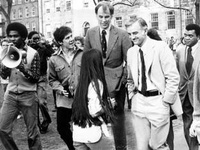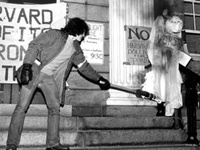At a hearing attended by about 400 people, including then-University President Derek C. Bok, scores of speakers denounced the ACSR’s recommendations.
“The ACSR report does not end Harvard’s complicity in apartheid, nor does it aid in bringing about the destruction of apartheid,” Daniel Rabinovitz ’78, a member of the SASC, said at the time.
Rabinovitz also alleged that Harvard’s refusal to divest was financially motivated and the fact that ACSR did not take stronger action against apartheid “should surprise no one since the number one priority of this University is profits.”
The ACSR later concluded that divestiture of Harvard’s holdings in all companies operating in South Africa would immediately cost the University between $5.7 and $16.5 million and between $5 million and $10 million annually. But University administrators denied that financial concerns played a role in their decision.
The next phase in the divestment battle came as the campus awaited the Corporation’s decision about the University’s South African investment policy. HUPD beefed up security as some students staged a four-day, round-the-clock vigil, camping out in front of University Hall, and others went on a hunger strike.
Other protesters took a more strong-armed approach.
Three days before the release of the report, more than 1,000 students participated in a rally, during which they confronted several deans in the Yard,
And after Bok refused to speak with student demonstrators, they blocked his entrance to Mass. Hall and threw themselves in front of the police car that was driving him along Mass. Ave.
As the Corporation met to discuss the ACSR’s recommendations, about 400 students demonstrated outside its offices under the watchful eyes of the Harvard University Police Department (HUPD) to protest the University’s alleged compliance with apartheid.
Demonstrators listened to a speech by Themba Vilakazi, an exiled member of the African National Congress, who told the assembled crowd, “the African people have decided not to beg anymore, but to fight.”
Bok, who attended the meeting, says he sympathized with students’ concerns, even if he disagreed with the divestment initiative.
“I think the point they raised was a legitimate one,” Bok says. “Apartheid is a perfectly frightful regime and I understand why some students were concerned about it.”
Student dissent only increased after the Corporation released its decision.
Like the ACSR, the Corporation decided to advocate a case-by-case analysis of “Harvard companies” operating under the apartheid system to decide which ones it believed should stay and which it felt it should ask to leave the nation.
But unlike the ACSR, the Corporation did not advocate the immediate sale of all stocks and bonds of banks that were lending money to the South African government. Instead, the Corporation decided to discuss with those banks the moral issues involved in loaning money to the segregationist government before deciding whether to divest.
Read more in News
Pataki: 'Yale is Going to Crush Harvard'














